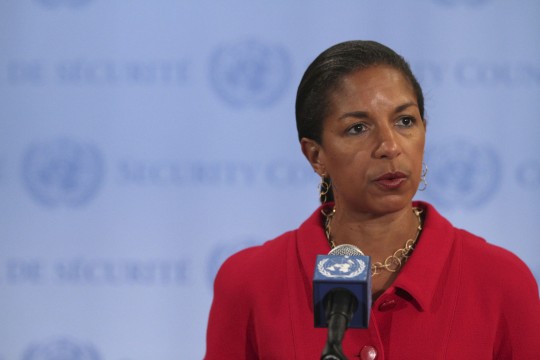U.N. ambassador and potential secretary of state nominee Susan Rice is under fire for what some are calling a lacking U.S. response to atrocities in the Democratic Republic of the Congo, citing her ties to its neighboring Rwandan President Paul Kagame.
According to the New York Times, Rice's critics include human rights advocates and U.N. diplomats who contend she has failed to adequately pressure Kagame to end support for the M23 rebel movement in the Congo. Its capture of the strategic city of Goma set off a national crisis in a country that has already seen more than three million people killed over the past decade.
Rice's relationship with Kagame stems from her prior work at Intellibridge, a strategic analysis firm in Washington which counted Kagame's government as a client, in addition to her role as the State Department's top African affairs expert in the Clinton Administration. Support for Kagame has been a facet of U.S. foreign policy since he led the Rwandan Patriotic Front to victory over the incumbent government in July 1994, effectively ending the genocide there.
Aides to Rice admitted she and Kagame were close but declined to comment on whether their relationship affected Rice's dealings with Rwanda since becoming U.N. ambassador under President Barack Obama. However, Rice's critics say she has worked to shield the Rwandan government and Kagame from international censure in spite of U.N. reports blaming their assistance for much of the brutality by M23.
This included an objection by Rice to French envoy Gerard Araud's call for a "naming and shaming" of Kagame's government for its support of M23 and a proposal to consider sanctions, a "watering down" of a Nov. 20 Security Council resolution condemning M23 for such actions as summary executions, rape and recruitment of child soldiers, and preventing the resolution from explicitly naming Rwanda as one of the external actors assisting the rebellion.
While Rice spokesman Payton Knopf assured that Rice strongly condemned the killings in Congo and felt diplomatic negotiations between Rwanda, Congo, and Uganda would have been affected if Rwanda was accused outright, her critics say that this is a repeat of the same lack of aggressive action toward the genocide in Rwanda during the Clinton years.
Rice has taken heavy criticism over the past month for failing to quell GOP concerns about her role in giving misleading reports about the Sept. 11 terrorist attack on the U.S. consulate in Benghazi, in addition to her investments in companies that do business with Iran.
